While there are “tried and true” standards in culinary education like knife skills, sanitation, and seasoning, the field also continues to progress with the times. Changing consumer trends, advancing technologies, and the needs of today’s students mean schools must respond with new programming and curriculum to stay current.
This is what we see as the possible future of culinary education, and how we at Auguste Escoffier School of Culinary Arts are evolving to meet these new demands.
Focus on Sustainability and Local Food Production
Sustainability isn’t just a buzzword. It’s an important philosophy to embrace as we move forward toward a greener future.
With limited natural resources on our planet, a focus on sustainability can help protect our biodiversity while still producing enough food for our global population. While chefs usually aren’t growing the food, the ingredients they choose to purchase can have an impact on the planet.
All of our cooking and dining decisions have an impact on the larger food ecosystem. The further that food has to travel to reach us, the more energy is consumed and waste is produced. That doesn’t mean that we can’t enjoy foods from around the world. But it does mean that using local alternatives when possible helps us to reduce our overall footprint.
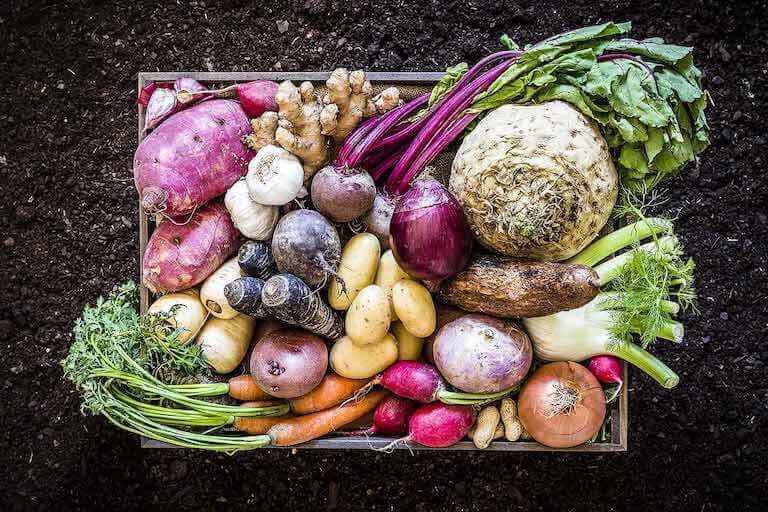
Preventing food waste is another vital piece of this puzzle. 80 billion pounds of food reach landfills each year, where decay creates methane and carbon dioxide. In fact, food waste in landfills accounts for 7% of global greenhouse gases.
Future cooks should be educated on the importance of sustainability and food waste, so they can be part of the solution. While shopping local and reducing waste on the consumer end also helps, the sheer volume of product purchased and used in a restaurant means that each cook or chef has the chance to make a major impact when they choose to support environmentally-conscious farmers and artisans.
“After my experience at Escoffier, I noticed a huge change in my business. I’m definitely more focused on waste management. I’m making more things from scratch instead of just buying them pre-bottled, using even the remains of vegetables and meats to blend and make marinades and stock.”*
Nahika Hillery, Austin Culinary Arts Graduate and Chef/Owner of Kreyól Korner Caribbean Cuisine
At Escoffier, Culinary Arts students can study these concepts in the six-week Farm to Table® Experience. This course can help students to understand the relationship between the food producer and the chef, and the environmental impact of farming, ranching, and fishing.
On-campus students can work with local farmers and/or food producers to better understand the nature of the local food economy, and online students may have the opportunity to participate in weekend workshops (optional, not part of the curriculum.)

Balance Between Tradition and Innovation
Classical cooking education has a long history. Since much of modern western cuisine is based on French technique, these methods are an important part of the culinarian’s skillset. They create the foundation of many modern cooking styles, even if you’re not cooking French food.
But too much focus on the past can make cooks rigid and uninventive. Today’s chefs often use modern technologies that the French masters never dreamed of. The very nature of a chef’s career has changed, with many stepping out of the kitchen and taking a more active role in the business and marketing sides of the food world.
Culinary education needs to walk a fine line between the traditional and the innovative, encouraging students to try new things and experiment in the kitchen.
“I work with 15 other chefs; that’s so much knowledge in one building. The students will teach me, too. Mistakes can turn into cool stuff and sometimes students bring knowledge from another chef in school. It’s very educational on both sides.”*
Escoffier Chef Instructor Emily Maddy
At Escoffier, students can begin their programs by exploring and practicing important culinary fundamentals like knife skills, proper food storage, and how to select the proper tools. These skills can serve as building blocks as students experiment with new ideas and subsequently move onto more advanced techniques.
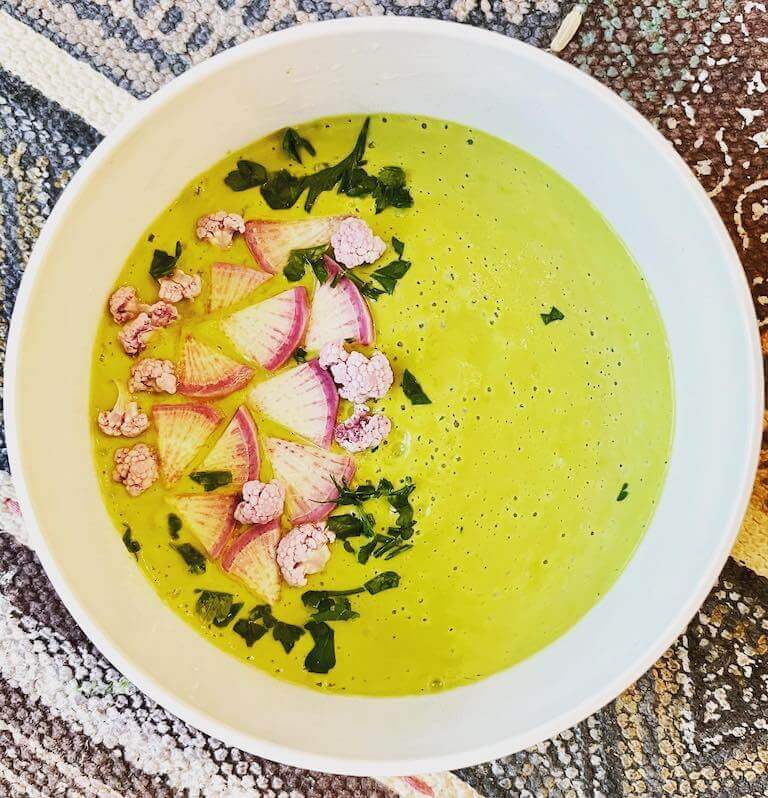
An exquisitely plated dish of parsley soup created by an Escoffier student
And as a pioneer in online culinary education, Escoffier has created an entirely new method of sharing the culinary arts, baking & pastry, plant-based cooking, holistic nutrition & wellness, and hospitality and restaurant operations with its students.
Increased Flexibility
Beyond what students can learn in culinary school, expect to see a shift in how they learn it.
We can do nearly anything online these days—shopping, banking, studying, playing games. Attending culinary school is no different!
Escoffier has been the industry leader in online culinary education. It is the only U.S. accredited institution offering 100% online diplomas and degrees nationwide with culinary classes and hands-on industry externships.** Students can now get the same high-quality education from industry-leading Chef Instructors, right from their own homes.
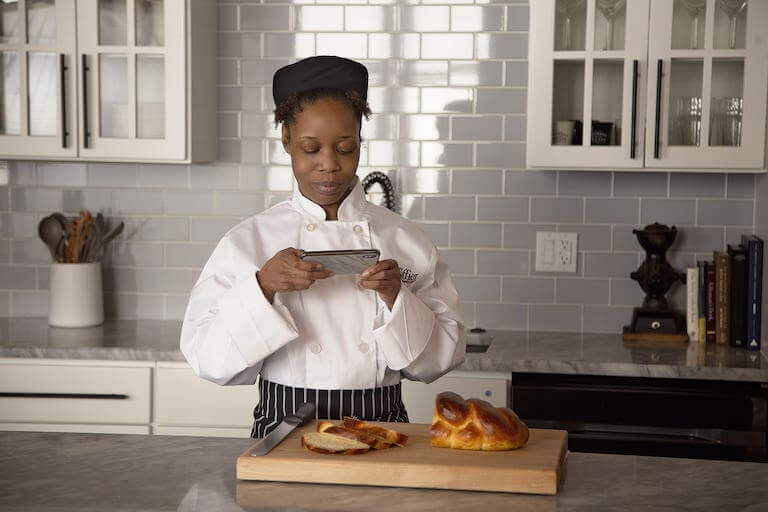
This increased flexibility has opened up culinary education to students from all over the world and all stages in life. Recent high school graduates, parents of small children, people switching careers, and working chefs who want to increase their skills can all fit culinary school into their busy lives with these online programs.
“I worked 60 hours a week as an employee while simultaneously running my business and keeping up with my personal life while attending this school. Because of the support and grace from the staff along with my determination to finish, I graduated from the culinary arts diploma program and completed my first semester in the associates program. So if I can do it, anyone can.”*
Shamaya Williams Coats, Escoffier Online Culinary Arts Graduate
The online culinary curriculum at Escoffier includes live and archive video class sessions, pre-recorded and live cooking demonstrations, reading assignments, cooking theory lessons, and labs with cooking assignments. As long as students meet their weekly program deadlines, they can complete this coursework whenever it’s convenient for them.
The success of this teaching method has proven how important it is to adapt to the changing needs of modern students.
Entrepreneurial and Business Education
Many of today’s young people aren’t interested in having a “job” that will pay the bills. They’re usually also looking for a passion. While culinary school students are all passionate about food, many also dream about going down the path of entrepreneurship.
Barriers to culinary entrepreneurship are lower than ever before. New technology and new service methods are putting entrepreneurship within reach without requiring extensive startup capital.
Food trucks, ghost restaurants, cottage industry bakeries—all are growing in popularity and are often easier to start than the traditional brick-and-mortar restaurant.
A culinary school education should prepare students for a possible future of entrepreneurship. Even if a student doesn’t have dreams of being the boss, they may still need to understand how the business works.

With the difficulties of the COVID-19 pandemic, restaurants are paying closer attention than ever to their finances. Diversification of revenue streams will be a major component of the restaurant industry’s future to reduce reliance on in-person dining. As operations grow more complicated, culinary students may need to be prepared to manage labor and product costs and maximize profits.
“The thing that makes me most proud of our students is their willingness to understand that the business management side of their degree is just as important as the kitchen side of their degree.”*
Susan Kaiser Yurish, Lead Chef Instructor
Escoffier students can take a variety of business-focused courses in their programs. From topics like foodservice math and accounting to purchasing & cost control, these courses can help students to see where the kitchen fits into the overall success of a foodservice operation, so they can be better prepared to make smart financial choices.
The Future Is Now
Auguste Escoffier was an innovator and disruptor of the culinary industry. We continue to live up to his name by constantly seeking to update and improve our programs, so we can better prepare future culinarians.
Culinary education seems to be evolving along with the food service industry. The best culinary schools will likely continue to innovate and work toward teaching the skills that students actually need in their future careers.
If you’re interested in experiencing a culinary education for yourself, contact us for more information.
If you’d like to read more about culinary education, try these articles next:
- Why Older Students Should Consider Culinary School
- What To Look For In a Good Culinary Arts Curriculum
- 5 Important Things to Know Before Starting Culinary School
This article was originally published on January, 15 2021, and has since been updated.
*Information may not reflect every student’s experience. Results and outcomes may be based on several factors, such as geographical region or previous experience.
**Our Boulder, CO campus is the only accredited institution in the United States to offer both fully online diploma and degree programs nationwide with culinary classes and hands-on industry externships. We are accredited by ACCET – A Partnership for Quality. ACCET is listed by the U.S. Department of Education as a nationally recognized accrediting agency.

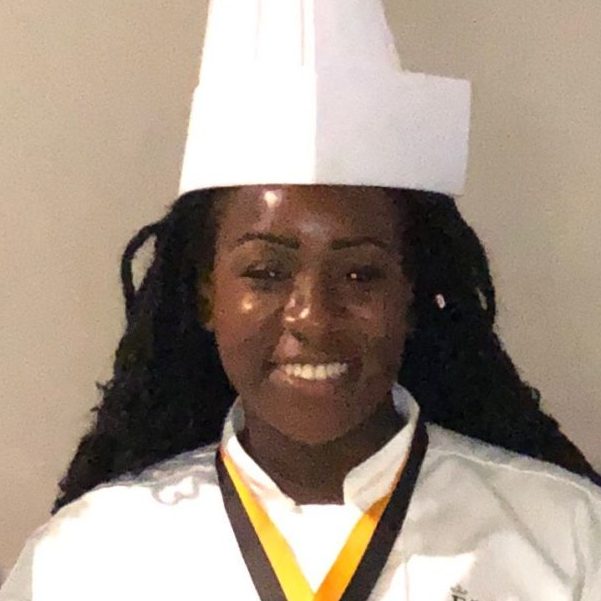 “After my experience at Escoffier, I noticed a huge change in my business. I’m definitely more focused on waste management. I’m making more things from scratch instead of just buying them pre-bottled, using even the remains of vegetables and meats to blend and make marinades and stock.”*
“After my experience at Escoffier, I noticed a huge change in my business. I’m definitely more focused on waste management. I’m making more things from scratch instead of just buying them pre-bottled, using even the remains of vegetables and meats to blend and make marinades and stock.”* “I work with 15 other chefs; that’s so much knowledge in one building. The students will teach me, too. Mistakes can turn into cool stuff and sometimes students bring knowledge from another chef in school. It’s very educational on both sides.”*
“I work with 15 other chefs; that’s so much knowledge in one building. The students will teach me, too. Mistakes can turn into cool stuff and sometimes students bring knowledge from another chef in school. It’s very educational on both sides.”*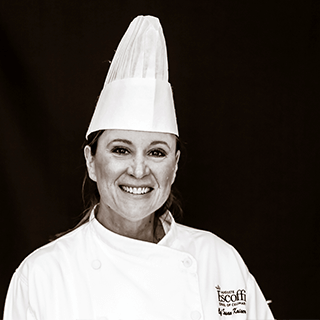 “The thing that makes me most proud of our students is their willingness to understand that the business management side of their degree is just as important as the kitchen side of their degree.”*
“The thing that makes me most proud of our students is their willingness to understand that the business management side of their degree is just as important as the kitchen side of their degree.”*